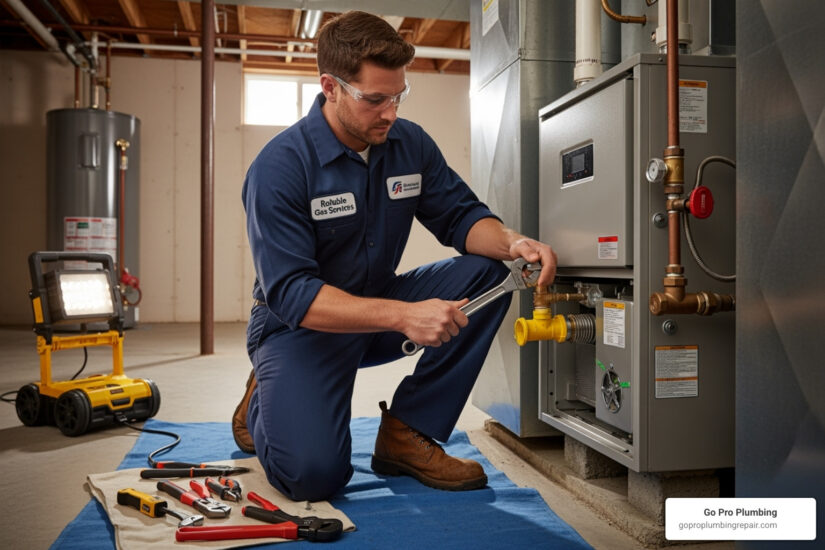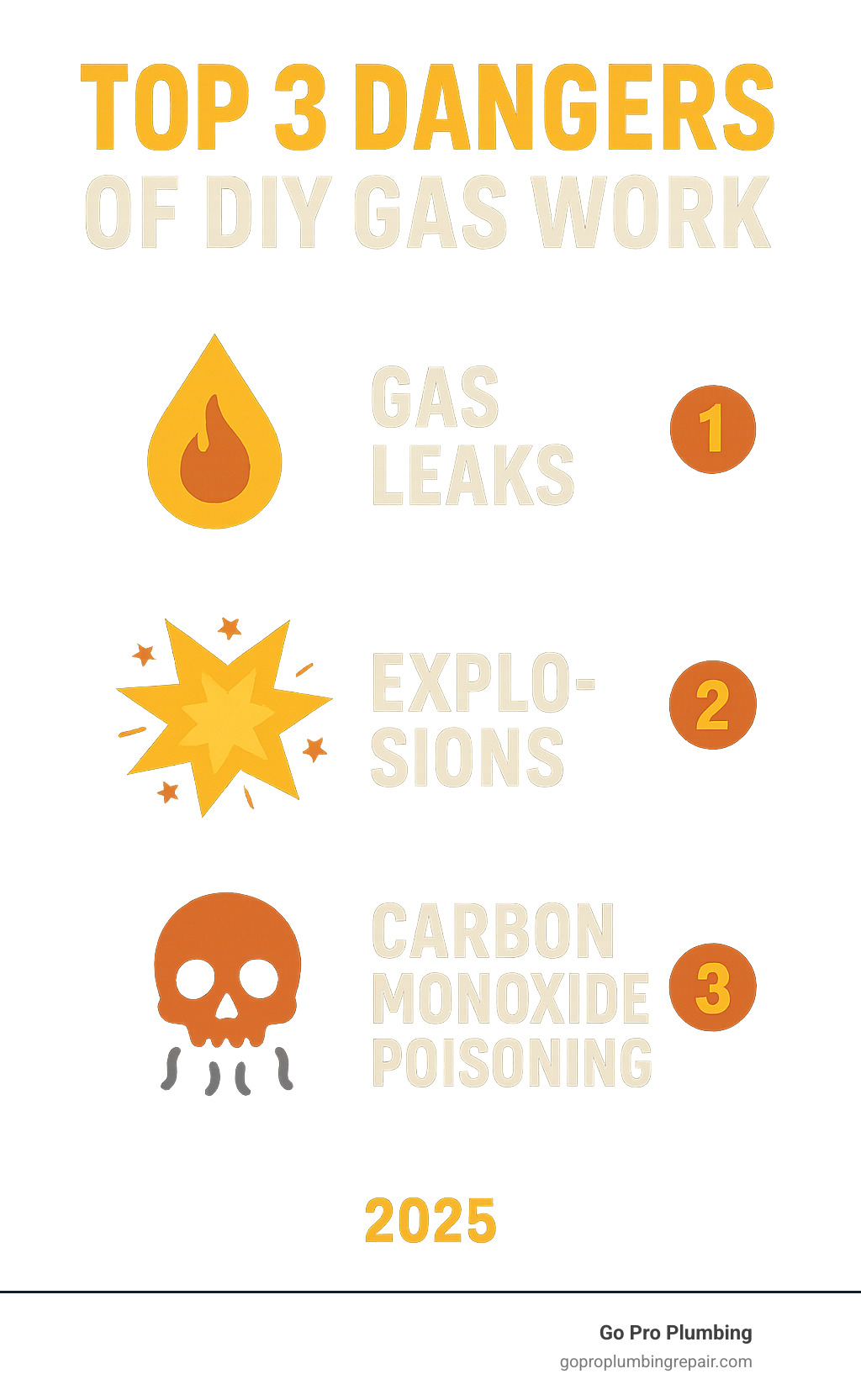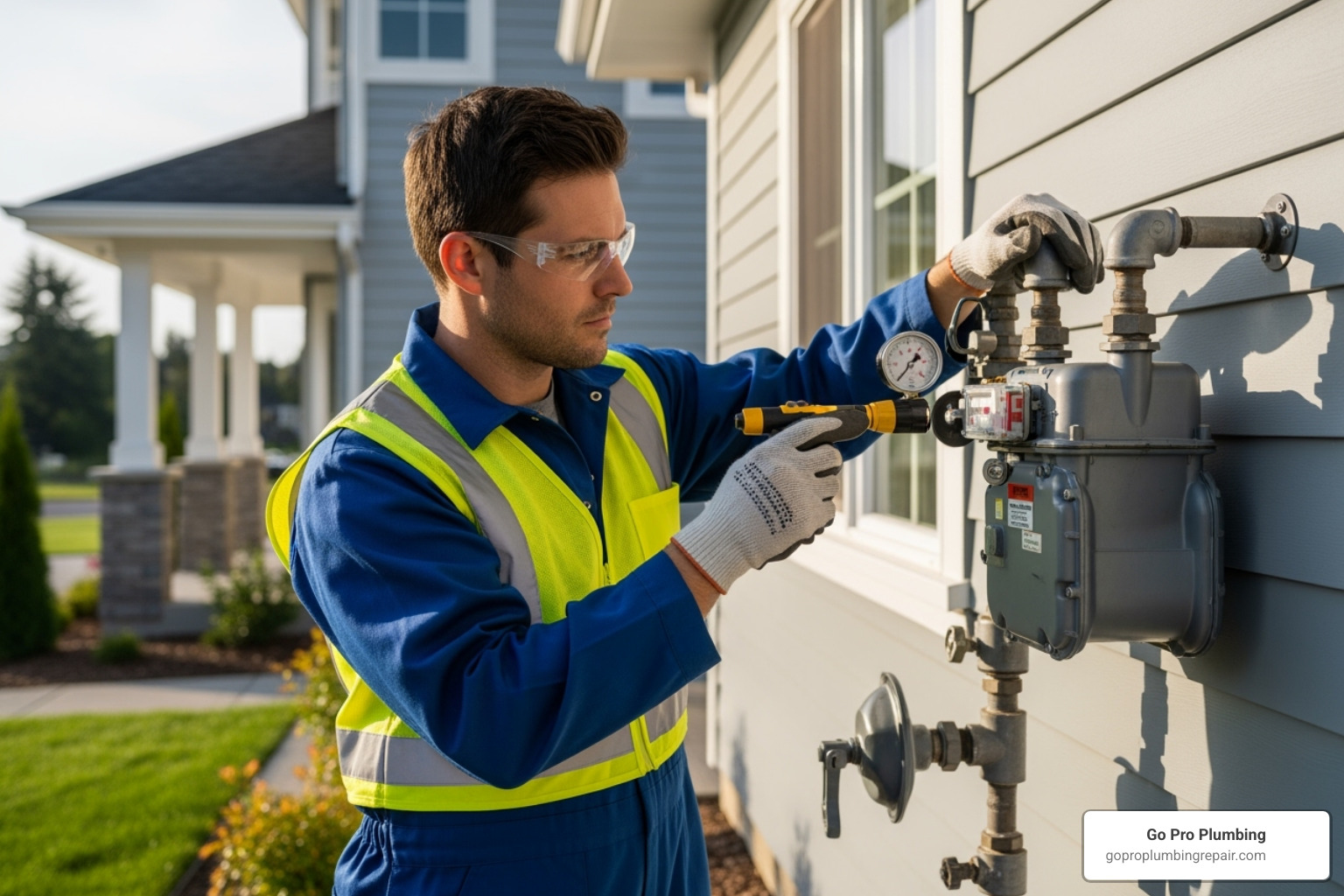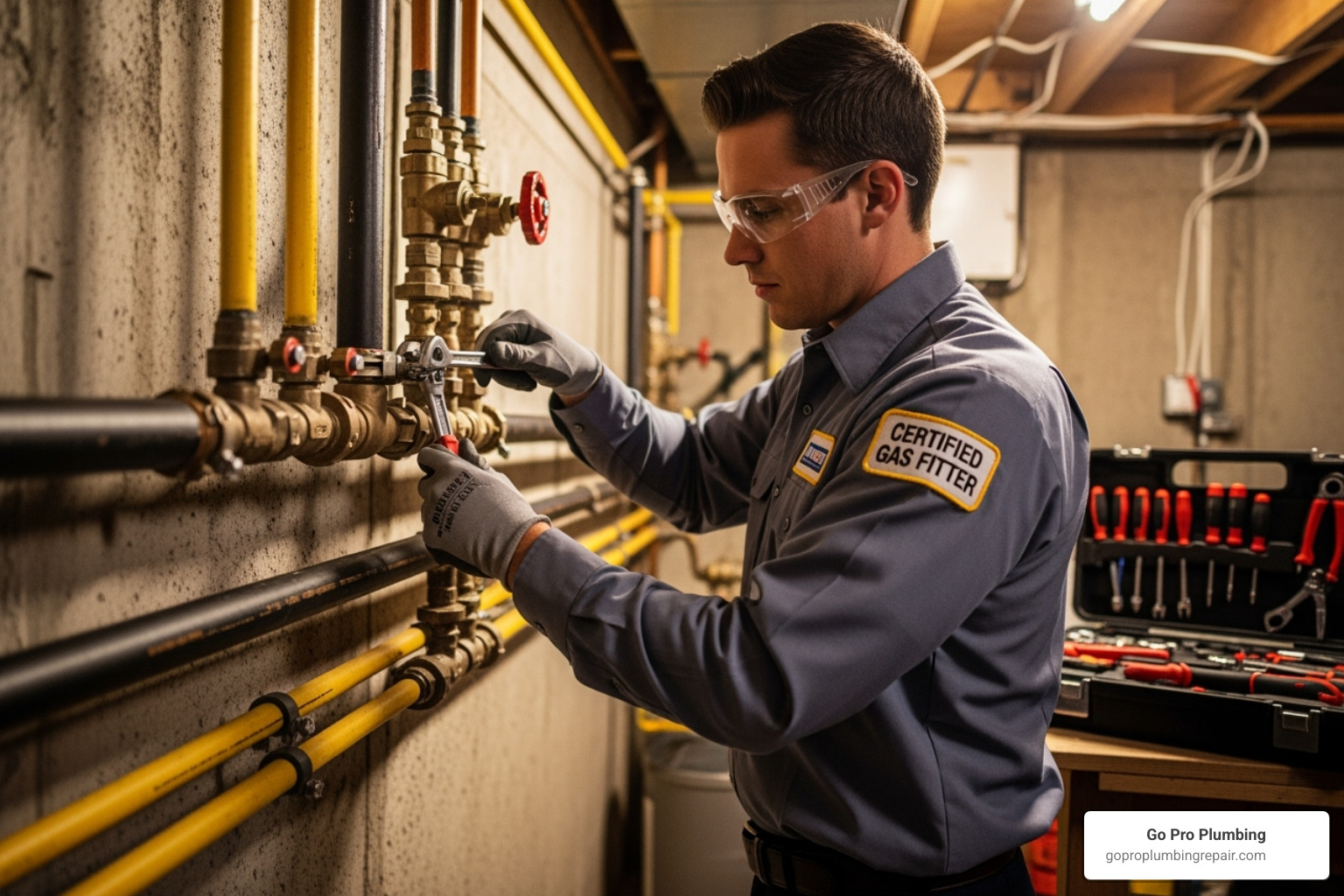Licensed Gas Fitters: Why Certification Matters for Your Safety
By Brian on August 14, 2025

Why a Licensed Gas Fitter is Essential for Your Safety
When it comes to the safety of your home or business, choosing a licensed gas fitter is a critical necessity. These highly trained and certified professionals are authorized to install, maintain, and repair natural gas and propane systems, ensuring every job meets strict safety and technical standards.
While gas is a powerful and efficient fuel, it carries inherent dangers. Invisible leaks can lead to catastrophic explosions or deadly carbon monoxide poisoning. For this reason, gas work is never a do-it-yourself (DIY) project; it requires specific knowledge, specialized tools, and strict adherence to safety codes.
A licensed professional has the expertise to ensure every gas connection, appliance, and pipe in your property is safe. This guide will explain why their certification is crucial for protecting your property and loved ones.

Quick licensed gas fitter definitions:
Defining the Expert: What is a Gas Fitter?

Think of a licensed gas fitter as your home’s gas safety guardian. These specialized professionals ensure every gas line, pipe, and appliance in your property works safely and efficiently. Unlike a typical handyperson, a gas fitter has undergone extensive training specific to gas systems. They understand the properties of natural gas and propane, know the correct pressure for your lines, and can spot potential problems before they become dangerous.
Their work requires incredible precision. Every measurement must be exact, every joint perfectly sealed, and every connection tested multiple times. This attention to detail is a matter of life and safety.
At Go Pro Plumbing, our team holds the proper certifications and experience to handle all your gas-related needs safely. You can learn more about our comprehensive Gas Plumbing Services in Sacramento, CA.
Key Responsibilities of a Professional Gas Fitter
A licensed gas fitter handles a wide range of critical tasks to keep your gas systems running safely, from new installations to emergency repairs.
- New gas line installation involves careful planning and precise execution to bring gas safely into your home or extend lines to new areas.
- Appliance hook-ups for stoves, dryers, and water heaters require expert connection and ensuring proper ventilation.
- Gas pipe leak repair uses specialized equipment to detect and fix even the smallest leaks quickly and safely.
- Safety system installation includes carbon monoxide detectors and emergency shut-off valves.
- Flue and vent inspection ensures harmful gases can escape your home properly.
- Connecting your home to gas lines from the street is a complex process managed during new construction or major renovations.
Each task requires specialized knowledge that only a trained professional should handle. For more on installations, see our guide on Gas Line Installation. If you suspect a leak, our Gas Pipe Leak Repair service is available for immediate help.
Gas Fitter vs. Plumber: Understanding the Crucial Differences
Many homeowners are confused about whether any plumber can work on gas lines. While there is some overlap, plumbing and gas fitting are distinct specialties.
| Feature | Gas Fitter | General Plumber |
|---|---|---|
| Specialization | Specializes in fuel gas systems like natural gas and propane, including piping, appliances, and safety devices | Specializes in water, drainage, and sewage systems, focusing on water supply and waste removal |
| Licensing | Requires a specific gas license or certification – a separate qualification beyond standard plumbing | May or may not hold the separate certification required for gas work |
| Primary Risks | Deals with flammable, potentially explosive substances and carbon monoxide poisoning risks | Handles water damage and sanitation issues, which are serious but typically less immediately life-threatening |
| Common Work | Installing gas lines, connecting gas appliances, repairing gas leaks, ensuring proper ventilation | Installing water pipes, fixing drains, repairing toilets and sinks, basic water heater work |
The key difference is that gas work requires specialized training and licensing that not all plumbers possess. Gas is invisible and highly dangerous if mishandled, with small mistakes potentially leading to explosions or carbon monoxide poisoning.
In the United States, professionals who work on gas systems are often called “natural gas plumbers” or plumbers with special gas endorsements. Regardless of the title, what matters is that they hold the proper gas-specific license. Always ask to see their credentials before any gas work begins to ensure your family’s safety.
The Path to Certification: Training and Licensing Requirements
Becoming a licensed gas fitter is a long and demanding process, designed to ensure public safety. There are no shortcuts when dealing with natural gas and propane systems. Every licensed professional has invested years mastering their craft through apprenticeships, formal education, and rigorous testing.
The journey typically starts with a hands-on apprenticeship, where trainees work under the supervision of seasoned professionals. For example, in Arkansas, a Gas Fitter Trainee must complete a two-year training agreement. This is paired with formal classroom instruction covering gas safety regulations, building codes, and the science behind gas systems.
After completing their training, aspiring gas fitters must pass both written and practical exams. The written portion tests their knowledge of codes and technical principles, while the practical exam proves they can perform the work safely. In Los Angeles County, candidates need at least four years of experience before they can even take the Journeyman Gas Fitter examination.
This comprehensive process ensures every licensed gas fitter has the technical skills and critical judgment needed to prevent accidents. For those considering a career in the trades, the U.S. Department of Labor career resources offers valuable information.
How Licensing Varies by Region
Gas fitting licensing requirements vary significantly by region. In the United States, the term “gas fitter” is less common; you are more likely to find “natural gas plumbers” or HVAC technicians with specific gas endorsements. Licensing is handled at the state or county level, meaning requirements in California can differ greatly from those in Arkansas.
Globally, the differences are even more pronounced. In Australia and Canada, “gas fitter” is the standard term, with strict licensing and compliance requirements. For example, some Canadian provinces require a surety bond, while Australian fitters must provide a compliance badge after every job. New Zealand gasfitters carry special license cards to prove their credentials.
These variations highlight why it’s crucial to verify that any professional you hire holds the proper credentials for your specific area. The title matters less than the official authorization to work safely with gas in your location.
Common Tiers of Gas Fitting Certification
Becoming a fully qualified licensed gas fitter often involves advancing through different levels of certification, each representing more experience and responsibility.
- Trainee or Apprentice: Newcomers to the trade who work under the direct supervision of experienced professionals. They learn everything from basic safety to advanced techniques during a multi-year training period.
- Journeyman: These professionals have completed their apprenticeship and passed rigorous exams, proving they can handle most gas work independently. Reaching this level typically requires several years of documented experience.
- Supervisor or Master Fitter: These are veterans of the trade who often run their own businesses, oversee complex projects, and mentor new apprentices. They have passed additional examinations and have extensive experience.
While not always required, the best professionals pursue continuing education to stay current with new technologies and updated safety standards. This tiered system ensures that those with the highest level of certification have the knowledge to handle any gas installation safely. For specific requirements in your area, check official resources like the California license requirements website.
The Non-Negotiable Benefits of Hiring a Licensed Gas Fitter

When it comes to gas work, the risks of hiring an unlicensed individual are too high. The benefits of hiring a licensed gas fitter are non-negotiable, encompassing safety, legal compliance, and peace of mind.
The most critical benefit is safety. Improper installation or repair can lead to:
- Gas Leaks: Even a small leak can accumulate and become highly explosive. Signs include a rotten egg smell or hissing sounds.
- Explosions: A gas leak ignited by a simple spark can cause devastating explosions, leading to injury, death, and property destruction.
- Carbon Monoxide Poisoning: Improperly vented appliances can produce this odorless, colorless, and highly toxic gas. A licensed gas fitter ensures proper ventilation to prevent this silent killer. Learn more about the dangers: Carbon monoxide poisoning facts.
Beyond immediate safety, hiring a licensed professional ensures:
- Code Compliance: Their work will pass all local and national building code inspections, avoiding fines and re-work.
- Insurance Validity: Most insurance policies require gas work to be done by a licensed professional. An incident caused by unlicensed work could result in a denied claim.
- Quality Workmanship: Extensive training means high-quality, durable work that reduces the need for future repairs.
- Peace of Mind: Knowing a qualified expert handled your gas system allows you to rest easy.
How to Verify Your Licensed Gas Fitter is Legitimate
It’s essential to verify the qualifications of anyone you hire for gas work. Here’s a simple checklist:
- Ask for Their License: A legitimate licensed gas fitter will always carry proof of their license and be willing to show it.
- Check with the State Licensing Board: Most states have online databases to verify a professional’s license status and check for disciplinary actions. This is the most reliable confirmation.
- Verify Insurance: Ask for proof of comprehensive liability insurance. This protects you from accidental property damage.
- Read Reviews and Ask for References: Check online reviews and ask for references to gauge their professionalism and reliability.
Taking these steps ensures you’re hiring a truly qualified and responsible professional. If you’re looking for pros in Northern California, you can always Find Local Pros by reaching out to us.
What to Expect During and After the Job
A professional process prioritizes safety and compliance. Here’s what you should expect:
During the Job:
- Assessment and Planning: The fitter will assess the work, discuss the plan, and explain the materials needed.
- Safety Protocols: Expect them to shut off the gas supply, ensure proper ventilation, and use specialized tools.
- Permits (if applicable): They will handle the permit process for new installations or major alterations to ensure code compliance.
After the Job:
- Safety Testing: The fitter will conduct thorough tests, such as pressure testing or using soapy water on joints, to ensure there are no leaks.
- Inspections: For permitted work, they will coordinate with a municipal inspector to verify the job meets all codes.
- Compliance Documentation: In many regions, you will receive a compliance certificate or similar document for your records, which is crucial for insurance and liability.
- Explanation and Cleanup: The fitter should explain the work performed, provide operating instructions, and leave the work area tidy.
This systematic approach ensures your gas system is functional, safe, and compliant. For more details on the process, read our guide: What to know about Getting a Gas Line Installed.
Frequently Asked Questions about Gas Fitting Services
We get a lot of questions about gas fitting services. Here are clear, straightforward answers to some of the most common inquiries.
What are the signs I need to call a gas fitter?
Knowing the signs of a gas problem is the first step to keeping your home safe. Call a licensed gas fitter immediately if you notice any of the following:
- A “rotten egg” or sulfur-like smell: This odor is added to natural gas to make leaks detectable. It’s a clear warning sign.
- Hissing or whistling sounds: Any unusual noise near a gas line or appliance could indicate a leak.
- Appliance issues: A yellow or orange flame (instead of blue), soot on an appliance, or a unit that won’t stay lit can signal a problem.
- Unexplained dead vegetation: Dying plants or bubbling in wet ground near an outdoor gas line can point to an underground leak.
- Carbon monoxide detector alarm: This is an emergency. Evacuate the building immediately and call for help.
- Renovations or new appliances: You’ll need a professional to safely move gas lines or install new gas-powered equipment.
If you suspect a gas leak, evacuate the area, avoid using any electronics or creating sparks, and call for help from a safe distance. Our Emergency Gas Line Service team is available for urgent situations in Northern California.
How much does it cost to hire a licensed gas fitter?
The cost of hiring a licensed gas fitter varies based on the job’s complexity, your location, and the materials required. Think of it as a critical investment in your safety.
- Hourly rates for gas work typically range from $45 to $200 per hour, with emergency services costing more.
- New gas line installation can range from $260 to $820 on average.
- Gas line repairs might cost $15 to $25 per linear foot.
- Moving an existing gas line could cost between $375 and $750.
Factors that influence the final price include the scope of the project, material costs, permit and inspection fees, and whether it’s a scheduled job or an emergency call. Labor rates also vary by geographic location.
Always get a written estimate before work begins. A reputable licensed gas fitter will provide a transparent breakdown of all costs.
Can a regular plumber work on gas lines?
This is a critical safety question, and the answer is: no, not unless they hold a specific license for gas work.
While both trades work with pipes, gas fitting requires specialized training and a separate certification that most general plumbers do not have. The risks associated with natural gas—explosions, fires, and carbon monoxide poisoning—are too severe to be handled by anyone without the proper qualifications.
In the U.S., a plumber must have an additional “gas endorsement” or a specific “natural gas plumber” license to legally and safely work on gas lines. Before hiring anyone for gas-related services, always ask to see their specific gas license to ensure they are qualified and that the work will meet all safety codes. For a deeper dive, read our post: Can a Plumber Fix a Gas Leak?.
Conclusion: Your Partner in Gas Safety
When it comes to your family’s safety, there is no room for compromise with gas systems. A licensed gas fitter is not just a recommendation—they are essential for any gas-related work in your home or business.
These professionals are your first line of defense against dangers like gas leaks, explosions, and carbon monoxide poisoning. Their rigorous training and certification ensure every job meets strict safety codes, passes inspections, and protects your property.
The peace of mind that comes from professional gas work is invaluable. You can rest easy knowing your gas lines are installed correctly, your appliances are properly vented, and your family is safe. This also helps you avoid the failed inspections, insurance issues, and costly repairs that often result from unlicensed work.
At Go Pro Plumbing, we take this responsibility seriously. As your trusted partner in Northern California, including Sacramento and Rancho Cordova, our team of certified licensed gas fitters is committed to technical excellence and outstanding customer service. We offer same-day service for when you need help most.
Don’t take chances with your safety. For professional and certified gas line services you can trust, contact our team for your Commercial Gas Line Installation in Sacramento, CA. We are here to be your reliable partner in gas safety.
